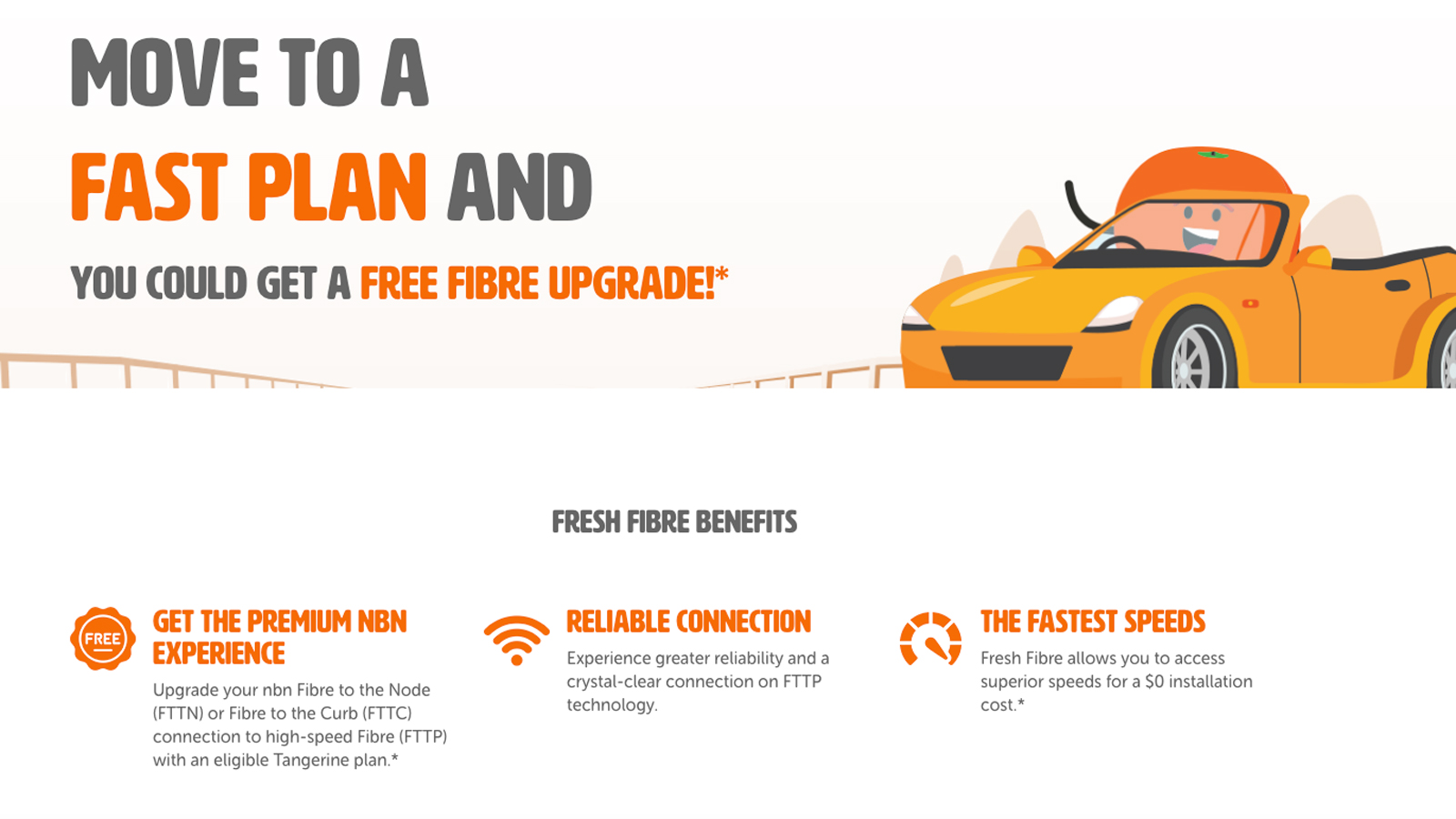Tom's Guide Verdict
Tangerine is one of the more affordable NBN providers in Australia, offering not just attractive introductory offers, but ongoing monthly costs that will appeal to many. A two-week free trial period and a no lock-in contract model make it a safe bet if you find you’re not happy, and we’d suggest being tactical with the cancellation date if you’re not. Ultimately, if you're looking to spend as little as possible on your NBN, Tangerine is well worth considering.
Pros
- +
Affordable monthly costs
- +
Maximum download speeds on NBN 25 to NBN 250 plans
Cons
- -
Customer support can be hit and miss
- -
Might not be the best option for gamers
Why you can trust Tom's Guide
Tangerine is an Australian-owned telco providing customers with NBN and mobile services. Notable for its low prices, Tangerine is one of the best NBN providers for anyone looking for the cheapest NBN plans, despite having to fend off competition from a number of other low-cost providers.
Tangerine offers NBN plans starting on the NBN 25 tier and moving all the way up to NBN 1000 for customers who have a connection type that can support it. The Melbourne-based telco regularly offers attractive introductory discounts for new customers, and gives the ability to bundle home and/or mobile phone services too.
On paper, then, Tangerine NBN shines as an attractive option for anyone looking for an affordable service. But how does it perform in reality, and are there better options on the market to choose from? Read on to find out all there is to know about Tangerine Telecom and our expert opinion of how it stacks up against the rest.
Noteworthy Tangerine Deals
NBN 25: save AU$20p/m for 6 months (then AU$69.90p/m)
NBN 50: save AU$23p/m for 6 months (then AU$84.90p/m)
NBN 100: save AU$20p/m for 6 months (then AU$88.90p/m)
Plans
Tangerine Telecom offers NBN plans from the Basic II (NBN 25) tier through to the Ultrafast (NBN 1000) tier. If you’re looking for the Basic I (NBN 12) tier, then you’ll need to look elsewhere (although we think it’s fair to assume that not many people will be looking for the slowest NBN speed tier).
Get instant access to breaking news, the hottest reviews, great deals and helpful tips.
What’s pleasing about Tangerine’s NBN 25 and NBN 50 plans, is that the telco advertises the maximum download speed during the busier evening hours of 7pm — 11pm. Despite these two speed tiers being two of the most popular in Australia (NBN 50 is the most popular by far, with over 4.6 million active plans) not all NBN providers can claim to deliver the maximum speeds during the busier hours, so this is a big tick for Tangerine.
Tangerine’s NBN plans, including regular pricing and typical evening speeds (correct at time of publishing) are as follows:
- NBN 25: AU$69.90p/m (Typical evening speed 25Mbps)
- NBN 50: AU$84.90p/m (Typical evening speed 50Mbps)
- NBN 100: AU$88.90p/m (Typical evening speed 100Mbps)
- NBN 100/40: AU$92.90p/m (Typical evening speed 100Mbps)
- NBN 250: AU$104.90p/m (Typical evening speed 250Mbps)
- NBN 1000: AU$119.90p/m (Typical evening speed 700Mbps)
Speeds
As mentioned above, Tangerine offers NBN plans for all NBN speed tiers, except NBN 12. The telco also claims the maximum typical evening speeds on its NBN 25, NBN 50 NBN 100 and NBN 250 plans.
Advertised typical evening speed figures drop the higher the speed increases. On Tangerine’s NBN 250 plan, for example, the typical evening speed is quoted as 100Mbps. For Tangerine’s Ultrafast NBN 1000 tier, the telco claims 700Mbps.
Previously, Tangerine used to indicate that its Ultrafast tier is configured to NBN 500/50, as opposed to 1000/50. This means the theoretical maximum download speed is 500Mbps and not the 1,000Mbps that the tier is technically capable of. However, that has recently changed, with the telco claiming this plan is now a part of the 1000/50 tier.
We can’t be sure exactly what speeds customers might experience in reality, because there has been no official information published by the Australian Competition and Consumer Commission (ACCC). The ACCC publishes quarterly data based on the performance of 10 selected NBN providers, which it monitors in real world situations with real customers.
Without ACCC data for Tangerine, we have to turn to customer reviews to determine how well it performs and if its speed claims are true. On ProductReview.com.au, Tangerine currently holds a 4.2 out of 5-star rating, with 5,745 customers saying they receive adequate speeds at the time of writing.
From our experience looking through customer reviews of several NBN providers, none can be deemed perfect. And as is the case with Tangerine, there are reviews from disgruntled customers claiming technical support isn’t up to par and others saying they experience frequent dropouts. But on the whole, we’d say the majority of customers are pleased with their service and appreciate they’re getting similar speeds (or in some cases faster) than other providers they were previously with, for a more affordable monthly cost.
Cost
In fact, the cost of Tangerine’s plans is without a doubt one of its biggest drawcards. The telco not only regularly hosts attractive introductory discounts on all of its NBN plans, but the regular monthly cost usually falls below or around the average for each speed tier.
From our own comparisons of NBN providers partnered with WhistleOut, Tangerine always comes in as one of the four cheapest providers, typically alongside Spintel, Flip, Dodo and occasionally Exetel.
To paint a clearer picture, we’ll run through the average monthly cost of each NBN speed tier (based on the regular monthly cost after any introductory discounts) and compare it to Tangerine’s regular monthly cost.
- NBN 25: Average monthly cost — AU$70.62. Tangerine monthly cost — AU$69.90
- NBN 50: Average monthly cost — AU$84.85. Tangerine monthly cost — AU$84.90
- NBN 100: Average monthly cost — AU$92.01. Tangerine monthly cost — AU$88.90
- NBN 250: Average monthly cost — AU$105.66. Tangerine monthly cost — AU$104.90
- NBN 1000: Average monthly cost — AU$118.38. Tangerine monthly cost — AU$119.90
It is worth remembering that Tangerine only advertises maximum typical evening speeds on its NBN 25 to NBN 250 plans. However, considering monthly costs are below average in all instances, we feel the drop in evening speed on other higher tiers is forgivable.
Tangerine doesn’t include a modem with its NBN plans, but you are able to buy one as an optional extra when placing your order. The telco supplies a Netcomm NF20 Wi-Fi 6 modem for AU$169.90 as a single unit, for AU$309.90 with an extra satellite to create a mesh network, or for AU$439.90 with two satellites. You do also have the option of bringing your own modem, but Tangerine stipulates you need to be capable of configuring it yourself.
Reliability
As with typical evening speed performance data, it’s difficult to ascertain how reliable of a service Tangerine provides, since there is no official ACCC data relating to NBN outages. So as before, we have to turn to customer reviews to formulate an opinion.
Based on customer reviews on Whirlpool, Tangerine appears to provide a good service and, as with many other NBN providers, your location can influence the reliability of your connection. In general, though, customers experience the speeds advertised. This writer has also previously been a Tangerine customer and, while it took some time to get connected — this was a fault of the NBN and not Tangerine — once connected, speeds were consistent, and he never experienced any dropouts (at least, nothing significant) in the six months he was connected.
Moreover, as with the majority of other NBN providers, Tangerine works on a no lock-in contract basis, so you are free to leave any time you wish.
Data caps
All of Tangerine’s NBN plans come with unlimited data included as standard. There are no other options to choose from, such as a ‘build your own plan’ service offered by some other providers.
Gaming
Tangerine doesn’t advertise itself as an NBN provider ideally suited to gamers, in the same way providers such as Aussie Broadband do. The latter promises optimised network routing to international gaming servers to help ensure ping speeds are kept to a minimum. There’s no such promise from Tangerine, but the telco simply states that its NBN 100 plans and higher are “suitable for gamers.”
It’s worth mentioning here that Tangerine uses the Vocus network to supply broadband to its customers. Vocus, as a company, buys wholesale access from the NBN and then resells it to retail service providers (RSPs) such as Tangerine. This means that any network congestion issues that arise are an issue for Vocus to fix and not NBN.
While it doesn’t paint a complete picture, and your personal experience might be different depending on where you live, this Whirlpool forum, with reports from Tangerine customers, suggests Tangerine might not be the best for gaming, as some customers mention congestion issues.
Extra features
Tangerine’s main selling point is its low-cost fees. If you’re looking to save as much as possible on your NBN connection, it is still a provider worth checking out.
Tangerine is also promoting the free fibre-to-the-premises (FTTP) NBN upgrade being rolled out around the country. This refers to the NBN’s commitment to upgrade customers with fibre-to-the-node (FTTN) and fibre-to-the-curb (FTTC) connections to the faster FTTP type. The NBN has already completed upgrades for nearly 9 million homes and businesses, which is around 90% of the network.
If you’re already signed up with Tangerine or you’re considering taking out a service with the RSP, you can enter your address to find out if you’re eligible. If you are and you wish to take advantage of the upgrade, then you will need to order a minimum of an NBN 100 plan if you’re an FTTN customer, or an NBN 250 plan if you’re currently an FTTC customer.
Tangerine will then organise for an NBN technician to come to your home to install the necessary equipment inside your property — the premises connection device (PCD) should have already been installed on the outside of your property — and you will soon be connected to faster fibre.
If it’s deemed that a more complex installation is required, then there may be additional costs involved. This cost will be passed on by any RSP, however, and not just Tangerine.
Unlike some other RSPs, you do not need to stay connected to your new Tangerine FTTP service for a minimum period.

Other features of Tangerine’s service include the ability to add a home phone and/or a mobile service to your plan. There is a single home phone option to select, which uses the current phone line that’s running into your property — as opposed to using Voice over Internet Protocol (VoIP) — and costs AU$10p/m. This includes unlimited local, national and Australian mobile calls. International numbers and calls to 13/1300 numbers are charged at an extra rate.
You also have the option of bundling a mobile SIM plan with your NBN service. Tangerine uses the Telstra network and has both 4G and 5G mobile plans available to choose from. They’re relatively well priced — at least compared to Telstra itself — but we have been able to find more affordable SIM plans from other providers using the Telstra network, such as Mate.
Included in all SIM plans are unlimited calls and texts within Australia, 1000 MMS messages a month (handy to send images to people who don’t use WhatsApp or iMessage, for example), international calls to 15 countries (not available on the 10GBp/m plan) and no lock-in contract. A useful feature across all mobile plans is the ability to bank up to 500GB of unused data, and you can also gift any unused data to other Tangerine mobile users (up to 50% of your standard monthly data allowance) if you wish.
Cancellation and hidden costs
If you ever decide to cancel a Tangerine NBN plan, the telco makes it pretty simple to do. Unlike some providers that require verbal confirmation over the phone — which you can still do with Tangerine — you can submit a cancellation request through your online account. All you need to do is select a date that you’d like your service to be cancelled and provide a reason.
Tangerine aims to adhere to your nominated cancellation date but does say that if your request is immediate, then it can take 24 to 48 hours to complete. At the time of publishing, there are no cancellation fees to pay if you cancel your NBN service.
If you have purchased a modem from Tangerine and cancel your service, this will not be refunded, but you will be able to keep the modem. They’re unlocked and can be used with another NBN provider.
Reputation
We’ve already given a few passing mentions to Tangerine’s reputation as an NBN provider in this review, but here we’ll dive a little deeper to discuss the positives and negatives based on real customer feedback.
On the whole, Tangerine scores favourably with consumers, scoring 5,745 five-star reviews on ProductReview.com.au at the time of publishing. The telco has even been awarded the 2023 ProductReview.com.au award for ‘Internet Service Provider.’ Our sister website Mozo, also crowned Tangerine NBN Provider of the Year in 2021, and followed this up with honourable mentions in its 2022 Awards.
Tangerine offers customers a few routes to contact them for any technical support. Existing customers can login to their online account and submit queries. There is a live chat option that can connect you to customer service reps for billing, technical issues or general queries, and there’s also a WhatsApp number you can message.
There's also a standard phone number you can call: 1800 211 112
Customer service teams are available from 8.30am — 7pm weekdays and 9am — 6pm on Saturdays. Technical support staff are available 8am — 10pm weekdays and 8am — 8pm Saturday and Sunday.
We do like the fact Tangerine provides an easy-to-find page on its website with information for configuring various modems. These include both modems supplied by Tangerine (Netcomm models and Google Nest) as well as information if you’re using your own. Do note, however, that while information is given for the BYO modem option, if you’re unsure of anything, Tangerine may not be able to provide much technical support.
Other helpful information provided by Tangerine includes a Network Status page on its website. When on this page, you can view any network outages around the country and even view information for any planned maintenance. We like this transparency from Tangerine.
We can imagine if this information wasn't provided, such as planned maintenance, and your internet connection went down, you would be straight on the phone to complain. But the fact Tangerine provides this information ahead of time means there should be no surprises and you can plan for an outage.
Verdict
Overall, we feel we can recommend Tangerine as an NBN provider. The low monthly fees make it a compelling option for anyone looking for the cheapest NBN plans and wanting to maximise their savings.
We accept there are some negative reviews of the telco — particularly where online gaming is concerned — but while there are some other providers that score more favourably with consumers, some other more notable providers score lower.
Ultimately, we’d say if you’re looking for an affordable NBN provider, then give Tangerine a go, but just make sure you clarify with the customer representative you speak all the details relating to cancelling and/or changing your plan, just to avoid any confusion with the terms and conditions.

Lucy Scotting is a digital content writer for Tom’s Guide in Australia, primarily covering NBN and internet-related news. Lucy started her career writing for HR and staffing industry publications, with articles covering emerging tech, business and finance. In her spare time, Lucy can be found watching sci-fi movies, working on her dystopian fiction novel or hanging out with her dog, Fletcher.
- Max LangridgeSenior Editor, Tom's Guide AU
You must confirm your public display name before commenting
Please logout and then login again, you will then be prompted to enter your display name.

